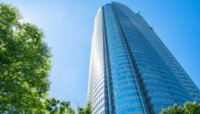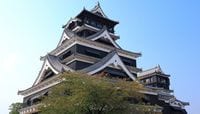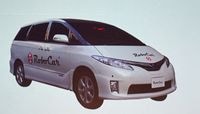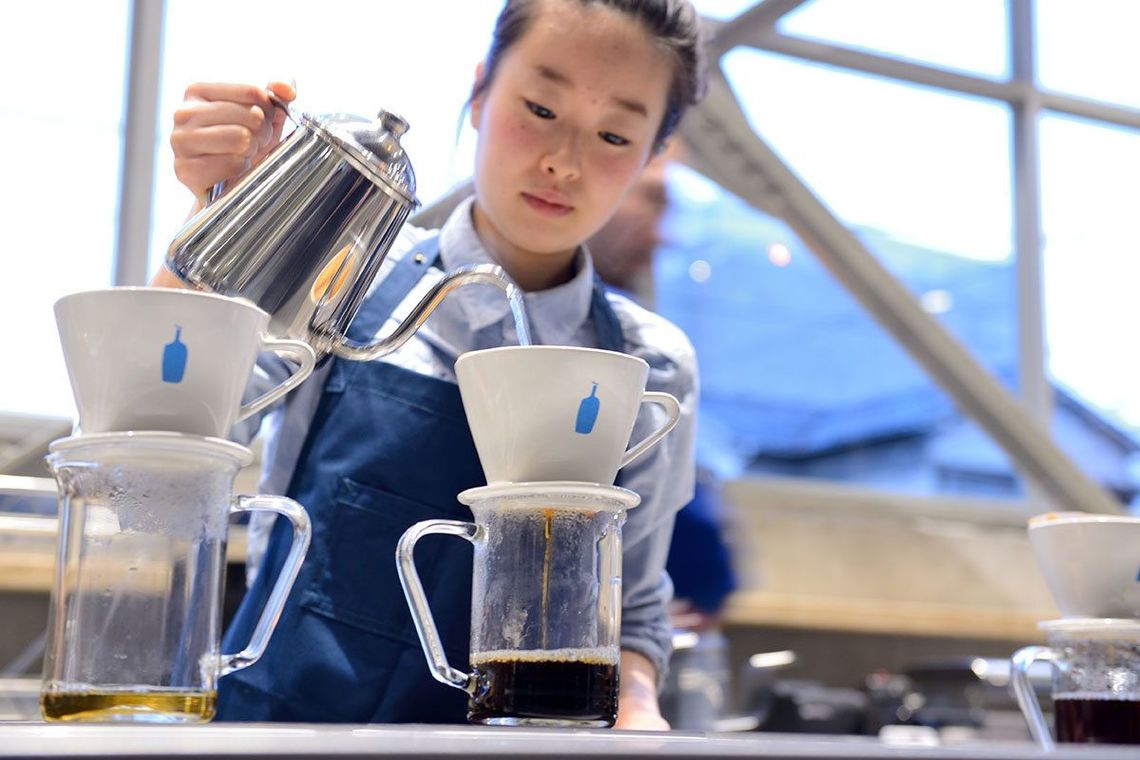
By the way, Blue Bottle recently announced that it’s postponing the opening of Tartine Bakery and Café in Daikanyama.
It didn’t have enough space for production. We learned a lot from opening Kiyosumi—like what the demand could be, and that success is great—but even success is hard on staff. Everybody has to work more hours. You have to produce much more than you thought you would.
It was a difficult decision to make, but we decided that we needed to step away from Daikanyama just because we all came to the realization that it's too small to be a real factory; too small to produce all the things we need to produce. I think we have to find a bigger production space.
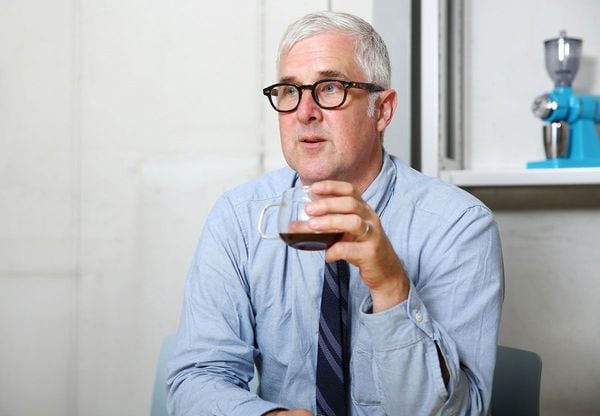
It must have been tough to decide such a thing at the last minute.
It's tough, but what's worse, is that we open and then we're sold out of everything by noon and there's no room to produce any more. I think that would be the worst decision.
Do you usually see a space before opening a store there?
Yes. Like here—I had a friend who liked this neighborhood, and showed me pictures of it. He thought this was kind of an interesting neighborhood, and showed me pictures of the gardens, the museum and this building. We saw how interesting it really was, and we thought, ‘Well, that sounds like fun’. We all flew out, and we walked around the neighborhood. We spent some time, we had lunch and we went to the museum. But that’s not the traditional way.
But we really liked this neighborhood. It's more peaceful and it’s inexpensive, but it's very close to the center of Tokyo. That's how I like to do it—I like to walk around, drive around, and see what the neighborhood is like.
A Perfect croissant for a perfect coffee
Why did you acquire the bakery in the first place?
If you could have the world's best croissants, why not? I've known Chad (Robertson) for a long time. He's been wanting to grow, but he hadn't found the right team. Then he was here when we opened. The first week, he saw how well the team here was working with this launch, as well as the incredible demand, and that's when he said he found the team that he wanted to work with.
Will Tartine sell any bread that’s special to Japan?
You should talk to Chad about that—but he is very much accustomed to using local ingredients. He’s been going up to Hokkaido, talking to wheat farmers there and experimenting with Hokkaido wheat and Hokkaido butter. So, it'll be very much Tartine.
Blue Bottle raised $27.5 million last year. How do you spend that much money?
Look around.
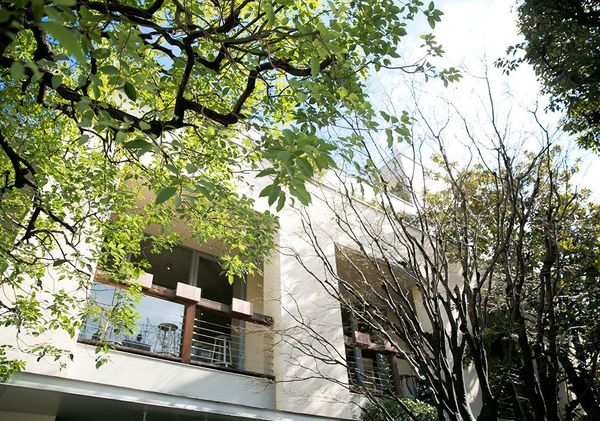
Are you thinking about buying any other companies?
We hadn’t planned to acquire four companies—it just kind of worked out that way. The reason why we could make all those acquisitions was because we had the confidence of our investors to spend the money well. Hopefully we'll continue to have that confidence.
What sort of quality does a company have to have to be a partner, or be a group member of Blue Bottle?
So much is about the team, because these are people I’ve got to see every day or every week—so it has to feel like it's a natural fit. It's not just about how much money we're going to make, or real estate or anything like that. For example, Michael has been so influential in refining how we're making coffee. Neal is the person who set up Walmart.com, so he knows a lot about ecommerce, as well as technology—so that's an important business. Chad is one of the best bakers in the world. It's all about who we want to work with.
Blue Bottle is called “the Apple of the coffee industry”. How do you feel about that?
It's very flattering. I'm flattered—but I don't know, have you thought about why people do that? I like simplicity. I like peeling things away. I'm sure I can find one picture. It’s interesting—I got lucky with the name Blue Bottle as the name of the company, but it's also the logo; Apple is the name of the company, but it's also the logo.
I also think there's a real rigorous purity to Apple. You know those boxes that the iPhone come in, and how you pull the box apart—and that's part of the experience? It’s a vacuum—and that's a three-second vacuum. It's not four seconds or two seconds. It’s three seconds, because they determined that any longer than that, and you'll be frustrated—any shorter is boring.
They didn't make that up. Do you know about Kaikado canisters from Kyoto? It's about a thirty-second vacuum. That's a hundred-and-forty-year-old company. I went down there on my last trip. I think Apple has been really influenced by the very rigorous simplicity of a lot of Japanese design elements and their focus on simplicity and quality. I'm obviously very influenced by those things too. Apple's doing it for the world; we're doing it in twenty stores. Lessons are lessons.
Coffee and music
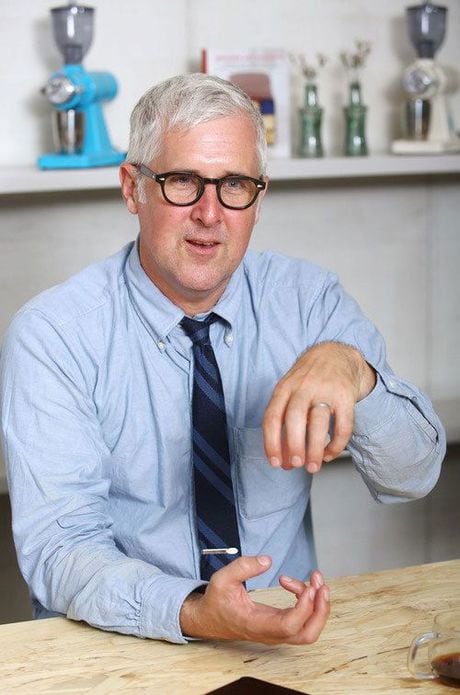
You talked about how you’ve learned a lot from opening the Kiyosumi store here. Have you taken any of the lessons you learned here, back to the stores in the US?
We've had a very successful relationship with the architect who works with us here, and I really feel like he understands what I want sometimes before I even have to say it. Just as we go on—as we progress—it's not a question of adding things, but just stripping things away. What is the essential purity of experience that we can give to people? What are all the extra things we can take away to give people a fundamental purity?
You are obviously influenced by Japanese culture and by the Japanese people. Do you have any Japanese customs that you pay respect to?
Oh, so many. I just love the culture of artisanship that is so prevalent. Obviously, I love artisans like Kaikado—who do such amazing things—and great sushi chefs at the fish market. I tell people it doesn't matter what you're into—whether it's blue jeans, or coffee, or mozzarella cheese—there's somebody in Tokyo doing it better than anybody else in the world.
You used to be a clarinet player. Have your experiences and sensitivities as a musician had any influence on running a coffee company?
I think they do. I was thinking about this, because people think that if you're a classical musician, what you do is you put on your tuxedo and you go on stage to play. That's really a pretty small part of it. What you really do is—you're alone in a room playing the same thing over and over and over again, hundreds of thousands of times, trying to be a tiny, tiny, tiny bit better. To repeat is to perfect. I think the ability to repeat over and over, is really to be in coffee.
If you were going to make any improvements to Blue Bottle, what sort of things would you like to do?
I would like to open places with a little faster timeline. We could work on having better communication, and faster communication, so we can open better. I'd like to have more facilities for testing. I wish we had a space where we could work out a lot of our retail issues before we debut them. We're getting closer to building an R&D space. I think that'll be helpful.
I thought it's the Blue Bottle style to slowly open stores.
Is it? That's what we've done. Still, we have twenty stores. That's good—and we have ten more coming. We're getting better and better at it. The store feels a certain way because we really care about things; like how the doorknob feels when you walk in, as well as what you see, and how the light shines in the pastry kitchen. It takes a lot of time to do that.

